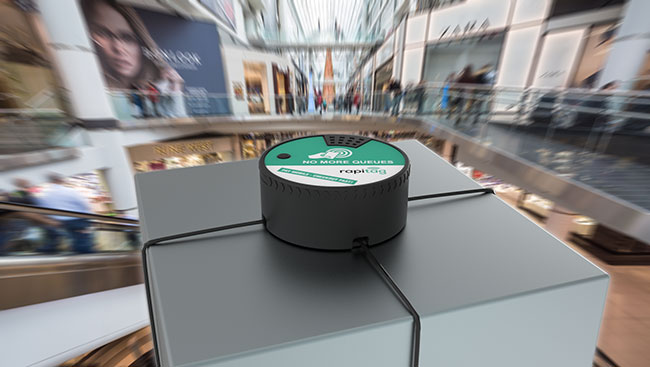The Munich-based developers Alexander Schneider and Sebastian Müller are behind the start-up company Rapitag. The two have a heart for customers under time pressure. That’s why they have developed an intelligent anti-theft device that gives consumers a new kind of shopping experience.
Rapitag allows customers to pay for the selected product on the spot directly at the shelf using their smartphone. In a large German electronics chain in Munich, the technology has already found its way into the headphone department. Anyone who wants to treat themselves to new headphones here can benefit from the innovative payment technology. The buyer simply downloads an app onto their smartphone. After registering and paying for the desired headphones, the customer holds the cell phone up to the product’s anti-theft device. This is then automatically unlocked, remains in the store and the customer can leave the store with the goods.
No need to queue at the checkout.
If reading this article makes you think of the self-checkout systems of a large Swedish furniture store and some supermarkets, you’re not entirely wrong, but what’s new and innovative about Rapitag is the added value for the customer. What exactly does that mean? Queuing is queuing. Whether a customer is queuing at the central checkout or a self-checkout is actually relatively irrelevant. Both cost valuable time. This is exactly what Rapitag wants to help customers save. Mobile payment also offers no real added value for customers – although they can pay with their smartphone, they still have to queue and wait in the traditional checkout line. This is where the Munich-based company’s new technology comes in, aiming to provide customers with a simple and convenient shopping experience on the one hand and offer retailers security with intelligent anti-theft protection on the other.
According to the founders of the innovative technology, they are in negotiations with several large European and American fashion chains. They see the main advantage of their invention for retailers in the fact that traditional retail with Rapitag can regain more influence in a market dominated by e-commerce. The introduction of new technology can help to market your own business in the media as extremely innovative. Both retailers and customers under time pressure can therefore benefit from the Rapitag intelligent anti-theft system.
The innovative project was realized by the engineering and design office “industrialpartners”, among others. The German company, which has offices in Frankfurt am Main, the Odenwald and the Chinese port city of Tianjin, supports its customers from the initial idea to the development of the entire product. The creative minds at “industrialpartners” were responsible for the concept development of the housing solution for the intelligent anti-theft device, the subsequent mechanical development and the production of a small series of 300 of these tags. The team, which has won several awards for its design ideas, used the HP Multi Jet Fusion 4200 production system to produce the small series. This system makes it possible for the first time to produce components with a density approaching one hundred percent, which surpass laser-sintered parts in terms of strength and load-bearing capacity and are also virtually isotropic. The advantages of high speed and low material costs, combined with extremely short turnaround times, make this rapid prototyping process one of the most cost-effective additive manufacturing processes available and can permanently replace the conventional plastic injection molding process for the production of small series on an industrial scale.


